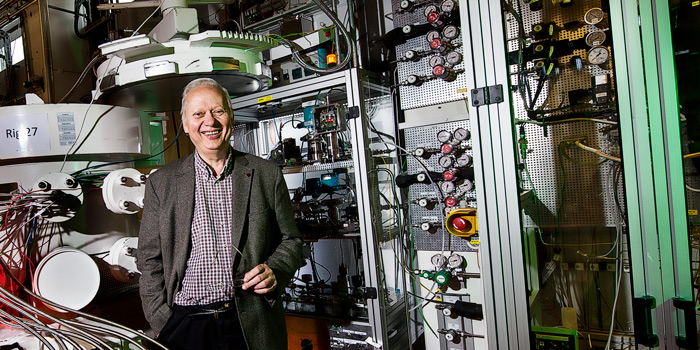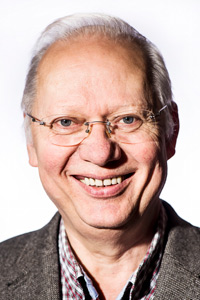Professor Mogens Bjerg Mogensen is a tough nut—one of those researchers who can leave you battered and bruised if your documentation and arguments are not up to scratch. Over the years, many of his researcher colleagues have seen numerous ideas shot down in flames with the simple explanation that ‘I’ve already thought of that’. However, his passion and remarkable work capacity have paid off because throughout his 40-year career, he has been one of the main reasons why Danish electrochemistry research ranks among the global elite today.
On 3 November, Mogens Bjerg Mogensen celebrated his 40th anniversary as a state-employed researcher, and the month before that, he was awarded the prestigious title of Fellow of the internationally recognized Electrochemical Society, which is based in the United States.
This is because Mogens Bjerg Mogensen does more than ‘simply’ having ideas; he also raises funds, writes reports and publications, and succeeds in taking an idea all the way to finished product.
“This is officially a 40th anniversary, but if you add up all the working hours, it’s probably closer to a 60th; he’s a real workhorse who puts in more hours than anyone I’ve ever met. His distinguishing feature is focused work, and before the advent of Wikipedia, he was our local oracle and reference work. And he was rarely wrong,” relates Søren Linderoth, Head of Department at DTU Energy, his colleague for two decades and his current boss.
The burning desire always to perform at the highest level combined with his amazing capacity to keep on working has made Mogens Bjerg Mogensen one of Denmark’s leading figures in the field of high-temperature fuel cells. He has contributed to the development of many of the analysis methods and the understanding of materials that have since become common practice both in Denmark and abroad. Moreover, he has trained many of the elite researchers and technicians who set the agenda in the field today.
"I’m not afraid to criticize in public or in private, and this sometimes hurts people’s feelings."
Professor Mogens Bjerg Mogensen, DTU Energy
Personally, Mogens Bjerg Mogensen ascribes much of his work ethic to having been born into a poor smallholder’s family in West Jutland. That and his enormous inquisitiveness and deep interest in research.
“I come from a very poor background, where I grew up the youngest of six children in a family of smallholders. There wasn’t always money for new clothes, for example, but there was always food on the table and plenty of love; and as the ‘youngster’, I was a bit spoiled. So when I decided that I wanted to continue studying at ‘the good school’, I was allowed to, because my parents have always given me their moral support, even if they didn’t have the money,” says Mogens.
Has already thought of it
During 40 years, he has helped elevate Danish research in electrolytes, high-pressure electrolysis, and reversible fuel cells to the global elite. And he has certainly made his mark in the field. Particularly among those who have been on the receiving end of his sharp wit and cutting comments.
Because Mogens the workhorse simply will not tolerate half-hearted input—either from himself or from others.
“I’m not afraid to criticize in public or in private, and this sometimes hurts people’s feelings. I’m employed as a reviewer on a large number of journals, and I’m well aware that I’m a tough critic who rejects a lot of articles. But it’s never personal, my decisions are always based firmly in academic considerations,” says Mogens Bjerg Mogensen.
Several of his colleagues have almost identical stories to tell of working with him over the years: he’s a tough nut who knows his stuff and doesn’t give an inch. During his career, the professor has shot down plenty of ideas with the simple explanation that he ‘has already thought of that’. This can be a little disheartening to start with.
“But he’s not joking; in the vast majority of cases he’s already moved on to the next level. And even though he may give the impression that he’s not really listening to what you say, you can certainly get through to him with an idea—if you have a persuasive academic argument. I really enjoy that, because it gives the discussion a boost and helps produce good results,” comments one of his colleagues.
The professor’s research has gained international recognition, and over the years he has been asked to hold talks at more than 40 scientific conferences. He has co-authored over 350 scientific articles, of which more than 250 have been printed in respected international publications.
He is also recognized—and perhaps a little feared—among his professional colleagues as a very strict peer reviewer of esteemed magazines and journals.

Finds the sore spots
“I know a lot of people who, while they weren’t exactly frightened, were less than thrilled when he raised his hand after they had presented projects or research at a conference or meeting. He is famous for his remarkable knowledge, and he always manages to put his finger on the sore spot—the area where the research is a bit weak or not sufficiently supported,” remarks Søren Linderoth, Head of Department at DTU Energy. He continues:
“At the end of the day, it’s a huge bonus. Because even though it may be irritating to be put in your place in front of a large audience, everyone is well aware that Mogens knows what he’s talking about when he starts asking questions about the areas that need more work. People even make jokes about it. If you manage to come up with a decent answer, your work has pretty much been rubber stamped. In fact, it’s more worrying if he doesn’t ask about your research, because this makes you suspect that the work you’re doing is insignificant.”
His colleagues do admit, however, that after four decades in the service of research, he has become a bit better at giving ground.
“This is something I haven’t always been good at, but it’s now time for the younger generation to take over, and I have a number of researchers ‘on my conscience’, the ones I’ve helped to teach by motivating and involving them, and by having high hopes of them. They’ve become good researchers; after all, it’s important to remember that research is teamwork,” says Mogens Bjerg Mogensen.
“I could never have done all this without them.”
Portrait in DTUavisen no 10, December 2015.

Mogens Bjerg Mogensen was born on 18 April 1948. He is married to Gurli Mogensen, who has a PhD and works as a researcher at Haldor Topsøe. The couple’s two daughters have given them two sons-in-law and four grandchildren.
2003: Research Professor, Risø National Laboratory/now DTU
1991: Senior Researcher, Risø National Laboratory
1980: Researcher, Risø National Laboratory
1979: Development Engineer, Hellesens A/S
1977: Postdoc, DTH
1977: National service, Danish Civil Defence Force
1977: PhD, Department of Physical Metallurgy, DTH
1973: 1982 MSc Eng in chemistry, DTH
1967: High school graduate in Mathematics and Physics, Holstebro Gymnasium